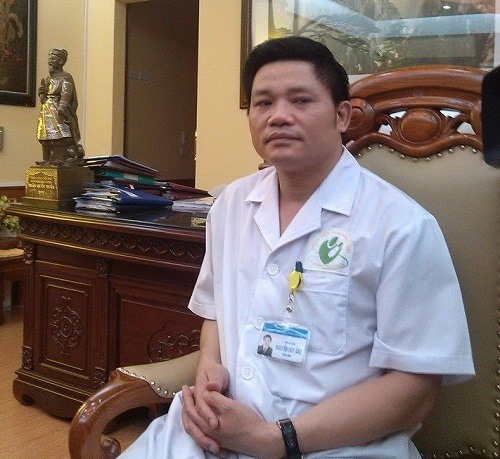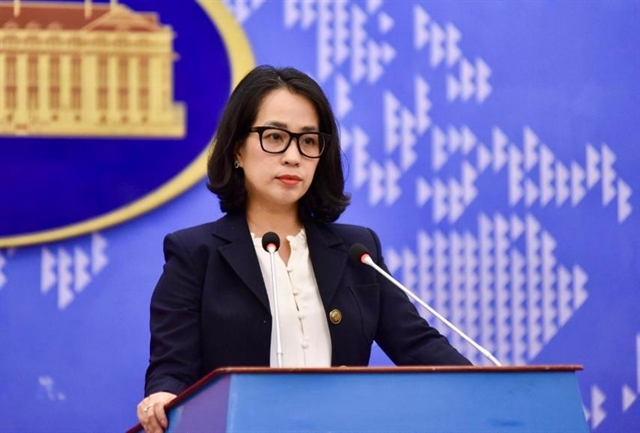 Features
Features

Dr Nguyễn Duy Ánh, director of the Hanoi Obstetrics and Gynecology Hospital, is one of 10 individuals being awarded the Outstanding Citizen of Hà Nội 2018 for his contribution to the country’s obstetrics sector.
 |
| Associate Prof and Dr Nguyễn Duy Ánh of the Hà Nội Obstetrics and Gynecology Hospital. |
Dr Nguyễn Duy Ánh, director of the Hanoi Obstetrics and Gynecology Hospital, is one of 10 individuals being awarded the Outstanding Citizen of Hà Nội 2018 for his contribution to the country’s obstetric medicine. He talks with Hà Ngân.
Inner Sanctum: Can you tell us about yourself?
I was born in the northern province of Bắc Ninh. I fell in love with medicine as a little boy. When I grew up, I passed an exam to study at the Hà Nội Medicine University as a resident physician. After graduating in 1990, I was retained to work as a lecturer at the university. In 1998, I was officially appointed at the Hanoi Obstetrics and Gynecology Hospital (HOGH). Three years later I was promoted to deputy director of the hospital and now I’m the director.
Since I became director, patient beds have increased from 200 to 1,000 and the top doctors earn approximately VNĐ100 million per month.
We have set up a Centre for Diagnosis and Expurgatory of Prenatal and Newborns using globally recognised high-tech facilities. Our centre is the biggest in Southeast Asia.
Inner Sanctum: Why is the salary so high for your best physicians compared to doctors at other hospital in Việt Nam?
We were given permission to manage our own finances last year, and we set out an agenda to attract the most talented physicians while trying to invest in key modern equipment.
As a result, we have earned nearly VNĐ1 trillion from our services, which is an increase of around 60 per cent.
One day I visited an obstetrics room where I met a middle-aged woman from a poor village on the outskirts of the city. She was at the hospital to care for her pregnant daughter.
I asked why her family had not used State health insurance to save money, and she replied: "I might be poor, but I only have one daughter so my family is trying our best to give her and my grandchild the benefit of high-tech services.”
Many other patients and their families share the sentiment. Apart from providing good care for patients with health insurance cards, we have invested in human resources to improve service quality.
Inner Sanctum: Can you tell us about one of your most difficult cases and how you dealt with it?
I’ve saved many mothers and their newborns but there is one case I cannot forget. An overseas Vietnamese man and his pregnant wife from Australia intended to give birth to their child in Việt Nam but when she arrived at the airport she went into premature labour. Her husband brought her to our hospital. In the emergency room, his wife had a heart attack, and despite the doctors’ efforts, she showed no signs of recovering.
“I immediately rushed to the room and was informed that the woman’s condition had not been good during her pregnancy plus the long flight from Australia had worsened the situation.
“Thanks to my almost 30 years experience in obstetrics, I told one of my colleagues to inject her with potassium, and several seconds later she regained consciousness. Our operation was successful. We rescued both the woman and her child.
Inner Sanctum: How do you apply high-tech in the obstetrics sector?
I always said we should have the best equipment available in the world at our hospital.
We’ve applied high-tech to grow eggs and take biopsies of embryos on the fifth day after impregnation to detect disorders caused by heredity factors in an effort to reduce the rate of congenial malformation.
Our hospital is leading a State-level scheme titled "Foetus Medicine" in which any foetus with stagnation on the brain, lungs or heart is treated from the 22nd to 26th week of pregnancy. This method has reduced the stillborns remarkably.
Inner Sanctum: What do you do apart from working at the hospital?
I’ve given lectures at Việt Nam’s two biggest universities, the Hà Nội National University and Hà Nội Medical University. I also help with charity projects by doing check-ups for disadvantaged women in remote and isolated areas.
As a result, I’ve been awarded certificates by the Government and the Prime Minister. Last year, I was recognized as a People’s Physician and this year, an Outstanding Citizen of the Capital. I’m very happy and will always try my best to serve our people’s health. VNS




